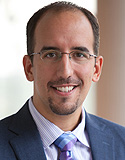
Diabetes Self-Management
Einstein-Ferkauf Researchers Secure $2.5 Million NIH Grant to Study Diabetes Self-Management and Behavioral Interventions
November 25, 2013 – (BRONX, NY) – More than 25 million Americans have diabetes, yet as many as 60 percent of type 2 diabetes patients do not follow treatment plans prescribed by their healthcare provider and about 50 percent fail to meet treatment recommendations for control of blood glucose levels. Consistent adherence to oral medications and injectable insulin, both used to keep blood glucose levels in check, is particularly challenging among young patients and ethnic minorities. Consequences are significant: lack of adherence can lead to or exacerbate eye disease, kidney disease and nerve damage.

Jeffrey Gonzalez, Ph.D.Now, researchers at Albert Einstein College of Medicine and Ferkauf Graduate School of Psychology, both affiliated with Yeshiva University, and the New York City Department of Health and Mental Hygiene (DOHMH) have been awarded a $2.5 million grant from the National Institutes of Health (NIH) to study a telephone-based approach to improving diabetes self-management and treatment outcomes in primary care.
"People who successfully self-manage their diabetes can reduce their risk for complications, but many patients have trouble sticking with their treatment regimen and making the necessary health-behavior changes," said Jeffrey Gonzalez, Ph.D., assistant professor of psychology at Ferkauf and assistant professor of medicine and of epidemiology & population health at Einstein. "One of our goals is to develop a treatment strategy that can be widely used in clinical practice to support patients with diabetes in their efforts to make changes and adhere to their regimen. We also want to learn whether this intervention can help reduce emotional distress related to diabetes, a common problem that often goes along with self-management difficulties."
"People who successfully self-manage their diabetes can reduce their risk for complications, but many patients have trouble sticking with their treatment regimen and making the necessary health behavior changes."
-- Jeffrey Gonzalez, Ph.D.
The five-year grant builds on a program for supporting diabetes self-management developed by Elizabeth Walker, Ph.D., director of the Prevention and Control Core at Einstein's Diabetes Research Center and professor of medicine and of epidemiology & population health. Dr. Walker's telephonic self-management support (Tele-SMS) program found clear evidence that phone calls made by trained health educators helps patients in underserved urban areas control their diabetes. Patients' A1C (glycosylated hemoglobin) level — a measure of average blood sugar levels over the previous three months — improved after one year among patients receiving calls in two prior NIH-funded trials.
With the new grant, researchers will add distress-management intervention components based on prior work by Dr. Gonzalez and others to the Tele-SMS model to evaluate whether the new approach can help improve other factors related to diabetes, such as depression, medication adherence, self-care and blood pressure. Those randomized to the intervention will receive between four and eight phone calls over the course of one year by trained NYC DOHMH employees, who will provide structured skills training and support for diabetes treatment adherence and self-management as well as management of emotional distress, when necessary. Healthcare providers will also be part of the intervention and will receive information from the health educators that may facilitate improved care. Participating patients will be drawn from primary care practices taking part in the NYC DOHMH Primary Care Information Project, which seeks to improve the quality of care in underserved communities by using health information technology.
"This new funding grant will also help us to determine whether our comprehensive program of telephonic support for diabetes management, as compared to educational printed materials provided to patients, is more helpful to patients and providers. We will also explore whether it is cost-effective, sustainable, and widely applicable in primary care," said Dr. Gonzalez.
Dr. Gonzalez will oversee the program along with co-principal investigator, Winfred Wu, M.D., director of public health informatics at DOHMH. Dr. Walker and Clyde Schechter, M.D., professor of family and social medicine and associate professor of epidemiology & population health at Einstein, will also collaborate on the new grant.
The five-year grant, "Translating telephonic diabetes self-management support to primary care practice" (R18DK098742), was awarded by National Institute of Diabetes and Digestive and Kidney Diseases, part of the NIH.
Other Top Stories
9/11 World Trade Center Exposure Linked to Heart Disease Among NYC Firefighters
On Becoming a Physician: New Einstein Students Receive White Coats and Stethoscopes
Novel Therapy for Acute Migraine Shows Promise in Phase 3 Clinical Trial
First Complete Wiring Diagram of an Animal's Nervous System
Multimillion Dollar NIH Grant to Help Reduce Opioid Use & Get Care to People Who Need It
NIH Grant Funds $23 Million Study of Diseases Affecting People Living with HIV
New TAILORx Data Guides Adjuvant Therapy in Younger Breast Cancer Patients
Einstein Celebrates Its 61st Commencement
Bolstering Biopsies: Testing Patients' Individual Cells to Guide Treatment



